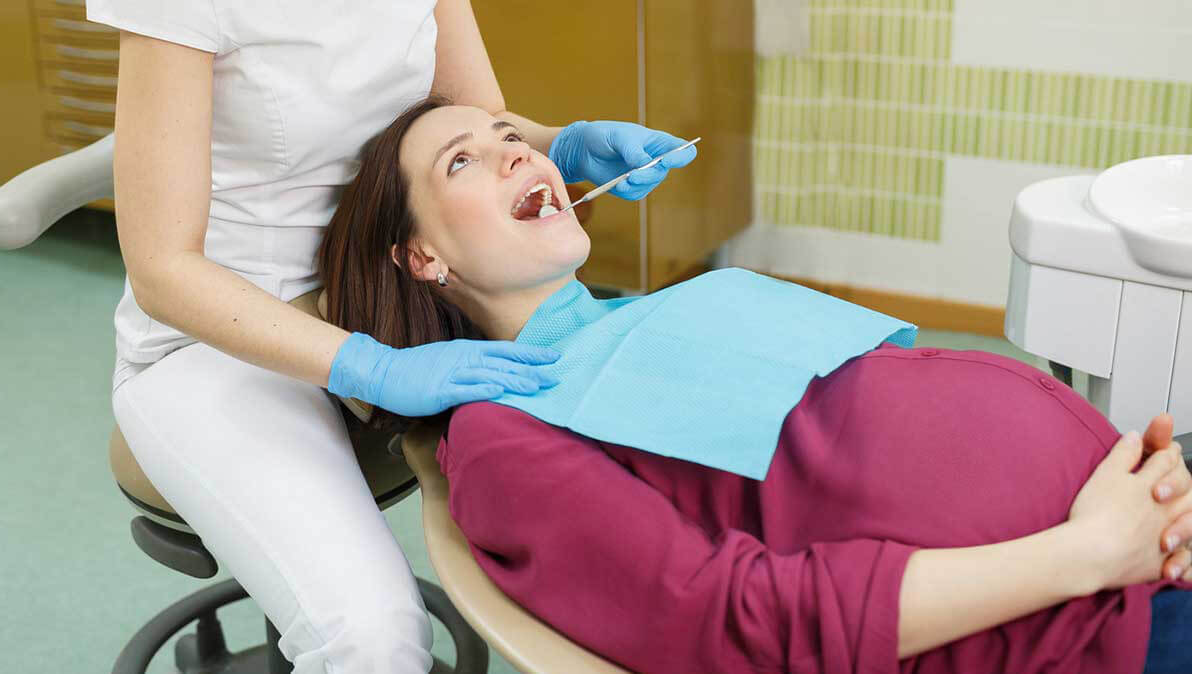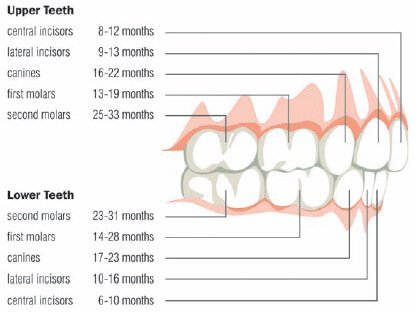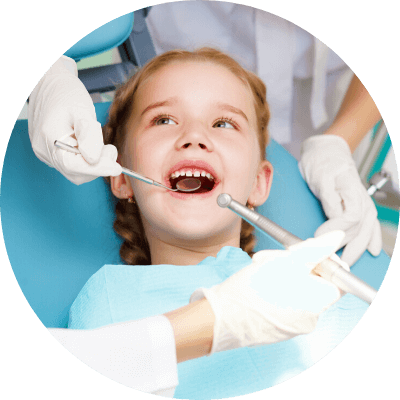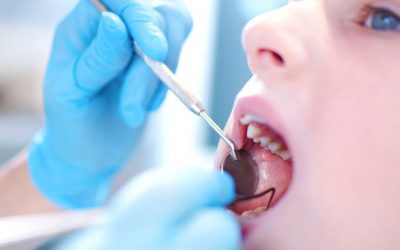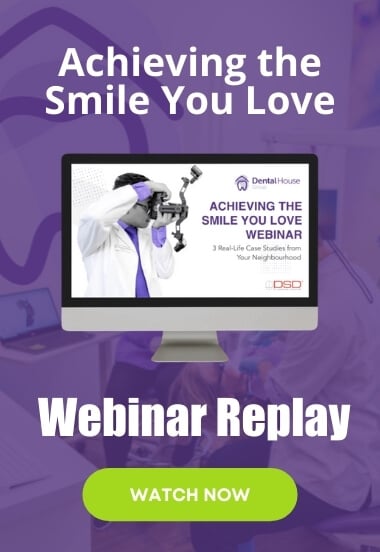Oral Health For Infants And Toddlers
Oral Health For Infants And Toddlers
Before a baby is born
A baby´s teeth start to form during pregnancy. By the time the baby is born, a full set of primary teeth has begun to form underneath the baby´s gums.
During the last three months of pregnancy, the mother provides the minerals needed to calcify the baby´s teeth. These minerals do not come from the mother´s teeth – and there is no truth to the saying a tooth is lost for every pregnancy. The best source of these minerals is from an increased intake of dairy foods (or other calcium-rich foods and drinks) by the mother. A nutritious diet and good dental hygiene during pregnancy will ensure that the mother´s and baby´s teeth will be healthy and strong.
Teething
Baby´s first tooth usually comes through the gum between 6 to 9 months of age. A full set of 20 primary teeth should be present in the mouth by 3 years of age.
Teething can cause some discomfort for babies – including red, swollen and sore gums. This can often make babies irritable and can cause increased dribbling, flushed cheeks and changed eating patterns. More widespread effects noticed during this time can include raised temperature, changed bowel movements and nappy rash. It is not known whether these effects are directly linked to teething or result from another minor infection occurring simultaneously. Signs of serious illness should not be attributed to teething and medical advice should be sought.
When do first teeth erupt?
Babies often place fingers or other objects in their mouths during teething times as pressure seems to relieve the discomfort. Giving a baby a clean cold teething ring will usually give some relief. Non-aspirin based teething gels available at pharmacies can also be of value.
Thumb and finger sucking
Babies have a natural sucking reflex that begins before birth. They often find it very soothing to suck a thumb, finger or dummy. For some children, prolonged sucking habits cause the front teeth and the surrounding bone to be pushed out of shape. Luckily most children stop the habit on their own. If the habit continues into preschool years, your dental professional will be happy to provide advice.
Just like adult teeth, the primary teeth can decay from the time they appear in the mouth. In fact, teeth decay more readily when they first come into the mouth. As teeth mature in the mouth, they become harder and can resist tooth decay better.
Tooth decay in early childhood
Decay is caused when bacteria use sugars from foods to produce acids. These acids attack teeth, causing mineral loss.
The very early stages of mineral loss are reversible, but continued acid attack leads to a cavity that requires a filling.
Babies are not born with decay-causing bacteria in their mouths. The bacteria are passed to babies by contact such as kissing and food tasting or by mothers cleaning the dummy in their own mouths. The transfer of these bacteria can be delayed if parents and caregivers have healthy, decay-free mouths. So one of the best ways to give your child a head start to staying decay-free is to ensure that your own teeth and gums are clean and healthy.
Early Childhood Caries (ECC) is the name given to a pattern of tooth decay that can develop in infants and toddlers. ECC usually begins on the upper front teeth and develops in the back (molar) teeth as these teeth appear in the mouth. The causes of ECC are discussed below.
Good diet habits start early
Eating patterns and the types of foods and drinks given to young children are essential. The risk of tooth decay can increase if children eat too often throughout the day. Sugary foods and drinks are known to cause tooth decay. Foods that stick to teeth for long periods of time, such as sticky toffees, can also lead to tooth decay. There is growing concern about the effects of acidic foods and acidic drinks such as fruit juices and soft drinks on teeth.
If infants and toddlers are allowed to suckle for prolonged or frequent periods during the day or night (longer than needed for nutritional purposes), their teeth may be more at risk of developing decay. Any sweet fluids in baby bottles other than water can cause early tooth decay. Sweet fluids include flavoured milk, juices, cordials and soft drinks. The problem is made worse in infants and toddlers who suckle during sleep times because only a small amount of saliva is produced in the mouth while sleeping. Good saliva flow is important to protect teeth against decay.
Early tooth decay can also result from the frequent use of a dummy dipped into a sweetener such as honey.
How to prevent tooth decay
Give saliva time to work.
Saliva is the body´s natural defence against tooth decay. Saliva constantly replaces the minerals in teeth and washes away acids. To give saliva enough time to work, limit food and drink intake (other than water) throughout the day. Choose “tooth-friendly” snacks such as dairy products, fruits and vegetables.
Tooth brushing
Tooth brushing should begin when the first baby teeth appear in the mouth at 6 to 9 months. Use a small soft-bristled toothbrush to brush your child´s teeth gently. Later, a child can be given a toothbrush to play with at bath time to introduce brushing their own teeth. It is important that twice-daily tooth brushing becomes part of a child´s daily routine, much like taking a bath or brushing hair. Starting early sets up good habits for life!
The ideal toothbrush for a toddler has a small head and soft bristles to reach all areas of a small mouth and a handle design that is easy for little hands to hold. Always ensure that toddlers are supervised at tooth brushing time – helping to get to the hard to – reach areas of the mouth and encouraging spitting rather than swallowing or eating the toothpaste.
Child´s fluoride toothpaste
Using fluoride toothpaste twice a day is one of the most proven ways for you and your children to stay decay-free. Fluoride in toothpaste makes teeth more resistant to the acids produced after eating or drinking. Fluoride also puts back minerals that are lost from teeth.
It is important that children under the age of six use junior toothpaste, such as My First Colgate®. These toothpastes have a lower amount of fluoride than adult toothpaste. They usually have a milder flavour and less foam for tooth brushing beginners! A pea-sized amount of junior toothpaste should be placed on the brush by an adult. Always remember to store toothpaste out of reach of children.
Take a peek
Parents are encouraged to look in their children´s mouths regularly. Gently “lift the lip” and look for white spots at the gumline, particularly on the upper teeth. The white spots may be an early sign of tooth decay. If you find white spots, seek advice from a dental professional.
Start regular dental visits early. This can prevent little problems from becoming big ones.
8 toothy tips for babies and toddlers
To ensure your child has the best chance of staying decay-free, follow these tips:
- Follow a nutritious diet and ensure your own teeth and gums are clean and healthy during pregnancy and beyond.
- Avoid prolonged or frequent suckling beyond nutritional needs
- Avoid putting a child to bed with a bottle containing anything other than water
- Avoid placing flavoured milk, fruit juices, fruit drinks, vitamin C supplements, soft drinks or cordials in baby bottles. These drinks should only be offered in a cup.
- Avoid dipping a child´s dummy in any foods or liquids
- Begin cleaning a child´s teeth as soon as the teeth appear in the mouth. Start a twice-daily tooth brushing routine as soon as possible
- Look for early signs of tooth decay in your child´s mouth
- Visit your dental professional for a check-up around the time of your child´s first birthday.
To read the original article, click here.
DISCLAIMER:
The content has been made available for informational and educational purposes only. New Gisborne Dental House does not make any representation or warranties with respect to the accuracy, applicability, fitness, or completeness of the content.
The content is not intended to be a substitute for professional personal diagnosis or treatment. Always seek the advice of your dentist or another qualified health provider with any questions you may have regarding a dental or medical condition. Never disregard professional advice or delay seeking it because of something you have read or seen on the Site.



